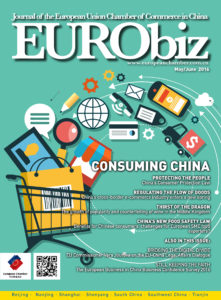 The European Chamber has followed with great interest two recent legal developments that can positively impact consumer rights in China: the Consumer Safety Law and the new Food Safety Law. Updated in 2013, the former includes stronger rights for consumers to return faulty products and places a heavier burden on businesses to prove, when challenged, that durable goods they have sold are not defective. The latter, passed in late 2015, includes beefed up standards for monitoring and inspection of food products, with detailed requirements that apply specifically to imported food.
The European Chamber has followed with great interest two recent legal developments that can positively impact consumer rights in China: the Consumer Safety Law and the new Food Safety Law. Updated in 2013, the former includes stronger rights for consumers to return faulty products and places a heavier burden on businesses to prove, when challenged, that durable goods they have sold are not defective. The latter, passed in late 2015, includes beefed up standards for monitoring and inspection of food products, with detailed requirements that apply specifically to imported food.
As positive as these laws can be, the manner in which they are implemented is key. The Chamber wants to ensure that they are not used as tools to deny European companies market access, or even to damage their brands and market position. In fact, on the issue of ‘professional shoppers’—those who deliberately buy products whose ingredients, components or labelling do not fully comply with domestic Chinese standards in order to pursue large sums in compensation—we have already enjoyed a lobbying success. Specifically, we engaged in a dialogue with the Beijing Administration of Industry and Commerce and successfully advocated for more appropriate treatment of cases where no safety risk has been posed and producers have not deliberately contravened Chinese standards. As a result, European producers of luxury and many other classes of goods now stand to save enormous amounts in unjustified fines.
It is therefore critical that Chinese laws are both strong and balanced, to ensure that China’s economic and social development is sustainable. In light of the abundance of high-quality, trustworthy European brands, many of which already enjoy an impeccable reputation in China, this approach plays to the strengths European business. China’s growing and evermore sophisticated middle class consumers are increasingly willing to pay for premium products: they want more high-quality choices, which, when given market access, European companies can provide. The fact that so many Chinese consumers currently make everyday purchases abroad for items like packaged food, baby products and even rice cookers highlights the costs to China’s economy of denying European companies market entry.
European companies, both big and small, therefore need to continually refine their understanding of consumer behaviour and regulatory requirements in China. Fortunately, as EU Commissioner Vĕra Jourová outlines on page six this issue, this process is aided by such mechanisms as the new EU-China Legal Affairs Dialogue. With the first of these dialogues focussing on e-commerce this should lead to a simplification of the existing legal framework and, ultimately, an increase of online cross-border trade.
I am pleased to report that the Chamber’s local board elections that were recently held across all chapters and our Annual General Meeting (AGM) on 28th April, were huge successes. It was an honour to have European Commission Vice President Jyrgi Katainen share his insights on both the direction of EU-China relations and European football at the AGM, especially as he did so before meeting with his Chinese counterparts. It was also great that everyone had the chance to thank outgoing Chamber Vice President Mats Harborn for his outstanding contributions over the last three years and to welcome incoming Vice President Patrick Horgan, who has very big shoes to fill.
Needless to say, it is a great honour to serve as your president for this third and final year of my current tenure. I have already started to redouble the Chamber’s efforts on your behalf across all chapters, especially in the areas of outreach to government officials and media, as well as the development of a risk management tool that will help us to prepare for all possible contingencies. Furthermore, following the recent publication of local position papers for Tianjin and Southwest China—and the highly positive responses they received from both local Chinese officials and media—Nanjing is next!
Proposed amendments to our Articles of Association were also approved at the AGM. The Chamber has continued to grow and evolve since they were last updated in 2008, something that the new articles reflect. They contribute to our ability to continue to drive positive outcomes for our members. I am proud to report that the new articles also make us an even more inclusive organisation in which all member companies and individuals who want to make a difference can do so. Since value and effectiveness of the Chamber is determined by the degree to which our members contribute and remain engaged, we certainly hope that you will take full advantage. As ongoing changes in both regulatory and consumer landscapes highlight, there is still so much that needs to be done.
Jörg Wuttke
President
European Chamber of Commerce in China



Recent Comments